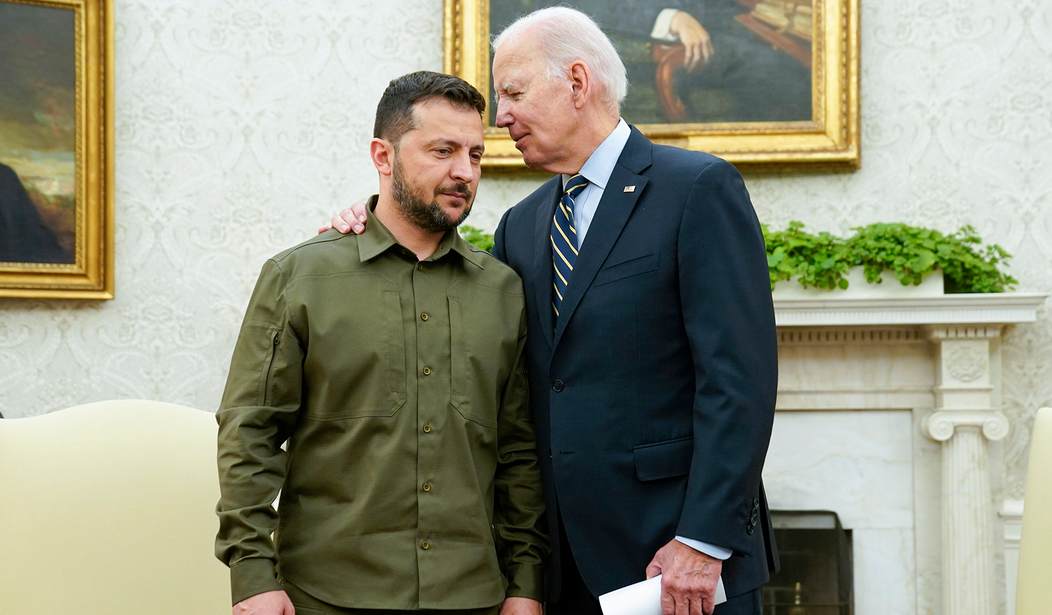The United States has enjoyed a historical period of unipolarity since the fall of the Soviet Union in December 1991, but the current global order-- one which favors democracy, free markets, and a fundamental respect for the rule of law-- is presently under siege.
Although Francis Fukuyama's vision of the "end of history" once served as a window into the optimism that permeated the West’s collective consciousness, our free society faces the greatest threat in recent memory-- with scholars warning that the global security situation closely resembles the map on the eve of WWI.
In a recent article, Niall Ferguson, a senior fellow at the Hoover Institution, highlighted this new reality, noting, “If you find the terminology of World War III alarmist, as some people do, I would merely point out that the objective of Russia is to wipe Ukraine from the map, the objective of Iran and Hamas is to wipe Israel from the map, and the objective of China is to end Taiwan’s democracy and autonomy.”
Under this ominous backdrop, both taxpayers and policymakers must understand that although our nation did not engender Liberty, it is now our duty to defend her.
Yet, as the United States prepares to confront the imminent threat of great power competition, experts have warned that our nation’s acquisition architecture is ill-prepared to meet the demands of the present security reality—with cumbersome requirements making it challenging to outpace our adversaries.
As Rob Murray, a senior fellow at the Atlantic Council and adjunct professor at Johns Hopkins University, recently quipped, this inevitably leads to “yesterday's technology being delivered tomorrow at next week's prices.”
Recommended
But as the Pentagon prepares to face off against our stated adversaries, leadership must look to the free-market lessons in acquisition learned on the Ukrainian battlefield.
According to Murray, Kyiv’s acquisition strategy has allowed combatant commanders to build a robust, decentralized, and empowered framework "capable of withstanding intense Russian aggression."
In a recent conversation, he told me that a crucial aspect of Ukraine’s effectiveness lies in the decentralized nature of its acquisition architecture.
"What enables a platoon, for example, to independently acquire off-the-shelf drones from manufacturers like DJI and modify them into strike-capable units—using components compatible with the Mavic 2 or Mavic 3—is the principle of decentralization,” he said.
While capabilities such as HIMARS have highlighted Ukraine's utilization of Western armaments against our mutual adversary, it's often the employment of commercially-sourced systems that have yielded the most striking successes.
These successes--both aerial and aquatic—have been evident since the onset of the Kremlin's full-scale assault. Notable deployments include August 2023, when Ukrainian kamikaze drones traveled over 230 miles into Russian territory to target enemy airfields, and October 2022, when a coordinated swarm of aerial and aquatic drones severely damaged Russia's Black Sea flagship, Admiral Makarov.
The swift deployment of commercial drones by Ukraine in diverse battlefields underscores how agility in fielding capabilities is itself a strategic advantage. This insight is of paramount importance if the future of warfare truly lies in drone warfare, as some experts have suggested.
The Pentagon has recognized the downsides of its acquisition architecture. It has provided tools—such as the Adaptive Acquisition Framework and the Other Transaction Authority—that allow for the expedited prototyping and fielding of critical capabilities.
In a recent conversation, Stephen Bowdren, program executive officer at the Marine Corps PEO Land Systems, helped me understand that these changes highlight an understanding in the acquisition community that the fleet's needs must always be considered alongside requirements.
He noted, “Our requirements are well-defined, but there's been an intriguing rediscovery process within the acquisition community. We've come to understand that, as important as our requirements are, the unique needs and experiences of each Marine are just as critical.”
Although it is unrealistic to expect a complete overhaul of the Pentagon’s acquisition architecture, the joint forces must embrace Ukraine’s entrepreneurial, decentralized approach to defense acquisition.
Some early glimpses of this paradigm shift in acquisition have already materialized across the Department of the Navy—with two notable examples being the Marine Innovation Unit and the Navy’s Task Force 59. Such programs bring speed to the table by working with non-traditional market actors and embracing commercially available capabilities.
Ultimately, the acquisition lessons from Ukraine's battlefield underscore a viable pathway toward revamping our military's acquisition architecture. By fostering an environment conducive to non-traditional acquisition partnerships and utilizing commercially available capabilities, the joint forces can catalyze innovation and enhance our defense posture in the face of emerging global threats. The time is ripe for a paradigm shift that embraces our nation’s free market principles, ensuring our military remains agile and robust in safeguarding our beloved city upon a hill.
Johannes Schmidt is a public affairs professional based in Washington, D.C. He holds a B.A. in international affairs from George Washington University and an M.A. in comparative history from Georgetown University. His work has been featured in outlets including the Washington Examiner, Fox News, Forbes, the Baltimore Sun, and the Chicago Tribune, among others.
























Join the conversation as a VIP Member